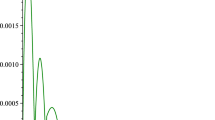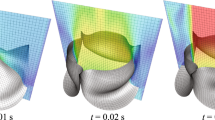Abstract
We investigate a generalized hybrid adjoint procedure for deriving the adjoint code for efficient sensitivity analysis and uncertainty propagation. The hybrid approach is a combination of generalized adjoint equations at higher level and automatic differentiation at subroutine level. The procedure developed is studied for implementation issues for the problem of uncertainty propagation in natural convection heat transport system temperature evolution. The results obtained by this method is validated by finite difference computation. The results demonstrate that for this application reasonably accurate results can be obtained efficiently by the proposed methodology compared to direct Monte-Carlo with response surface methodology.


















Similar content being viewed by others
References
IAEA (2005) Natural circulation in water cooled nuclear power plants; phenomena, models and methodology for system reliability assessments. Technical Report IAEA-TECDOC-1474, IAEA, Vienna, Austria, 2005
Mousavian SK, Misale M, D’Auria F, Salehi MA (2004) Transient and stability analysis in single-phase natural circulation. Ann Nucl Energy 31:1177–1198
Oblow EM (1978) Sensitivity theory for reactor thermal-hydraulics problems. Nucl Sci Eng 68:322–337
Parks CV, Maudlin PJ (1981) Application of sensitivity theory to a neutronic/thermal hydraulic reactor safety code. Nucl Technol 54(12):38–53
Cacuci DG (2003) Sensitivity and uncertainty Analysis, vol 1. Chapman and Hall, Boca Raton
Marques M, Pignatel JF, D’Auria F, Burgazzi L, Mauller C, Cojazzi G, La Lumia V (2002) Reliability methods for passive safety functions. In: Proceedings of the international conference ICONE, vol 10. pp 14–18
Burgazzi L, Fiorini GL, De Magistris F (1998) Reliability assessment of passive safety systems. In: Proceedings of the 6th international conference on nuclear engineering-ICONE 6, S. Diego, 1998
D’Auria F, Camargo C, Mazzantini O (2012) The best estimate plus uncertainty (BEPU) approach in licensing of current nuclear reactors. Nucl Sci Eng 248:317–328
Kalos MH, Whitlock PA (1997) Monte Carlo methods, 2nd edn. WILEY, New York
Antoulas AC (2005) Approximation of large-scale dynamical systems. Society for Industrial and Applied Mathematics, Philadelphia
Bartholomew C Michael, Brown Steve, Christianson Bruce, Laurence C, Dixon W (2000) Automatic differentiation of algorithms. J Comput Appl Math 124(1–2):171–190
John Arul A, Kannan Iyer, Velusamy K (2010) Efficient reliability estimate of passive thermal hydraulic safety system with automatic differentiation. Nucl Eng Des 240(10):2768–2778
Acknowledgments
The author thanks Dr. P. Chellapandi, director RDG, for his encouragement and support during the course of this work.
Author information
Authors and Affiliations
Corresponding author
Rights and permissions
About this article
Cite this article
Arul, A.J., Iyer, K. & Verma, A.K. Generalized hybrid approach to adjoint code derivation for efficient uncertainty and reliability studies. Int J Syst Assur Eng Manag 6, 172–182 (2015). https://doi.org/10.1007/s13198-014-0265-y
Received:
Revised:
Published:
Issue Date:
DOI: https://doi.org/10.1007/s13198-014-0265-y




